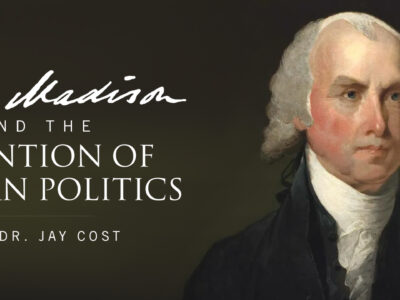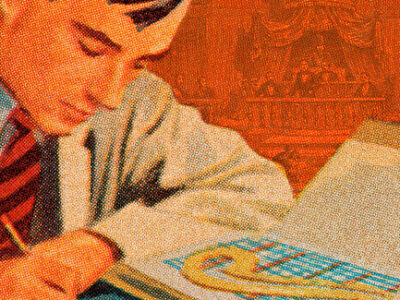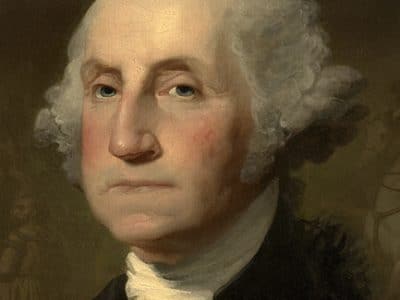Editor’s note: Colleen Sheehan, professor of politics and director of the Ryan Center for the Study of Free Institutions and the Public Good at Villanova University, spoke at our September 23, 2014, American Founders Luncheon in Pittsburgh. Many people requested that her talk be widely circulated. A shortened version of the lecture appears herein and is posted at our website. We encourage you to view the video at: www.visionandvalues.org/2014/11/sheehan
In speaking to a group of human rights activists in 1985, Nobel laureate Seamus Heaney reminded his audience that not one of us can escape the clarion call of conscience. We are citizens not only of the country that issues our passport, but of another land, another republic—the republic of conscience.
In 2009, a group of Orthodox, Catholic, and Evangelical Christians spoke in defense of the rights of conscience in the “Manhattan Declaration.” Led by Robert George, Timothy George, and Chuck Colson, this group declared that “while the whole scope of Christian moral concern, including a special concern for the poor and vulnerable, claims our attention, we are especially troubled that in our nation today the lives of the unborn, the disabled, and the elderly are severely threatened; that the institution of marriage … is in jeopardy of being redefined to accommodate fashionable ideologies; that freedom of religion and the rights of conscience are gravely jeopardized by those who would use the instruments of coercion to compel persons of faith to compromise their deepest convictions.”
More recently, the Supreme Court case of Burwell v. Hobby Lobby Stores became a proxy for a broader political clash in the United States between those claiming civil rights on one side and those claiming religious liberty on the other, threatening to split asunder the once-strong partnership between religious and civil liberty in America. Is there a way to work out the present battle so that both civil and religious liberty can be respected and protected? Can we be loyal to the cause of America and also be faithful to the call of conscience? Can we pledge allegiance to both provinces? Finally, can the American Founders, who first inscribed protection for both civil and religious liberties into law, offer any guidance to us in our current predicament?
*****
Shortly after the formation of the new government in 1789, James Madison introduced a series of amendments to the U. S. Constitution guaranteeing the protection of a broad range of individual rights. In 1791, 10 of these amendments were ratified by the requisite number of states, formally added to the Constitution, and are known today as the Bill of Rights. The first line of the First Amendment states: “Congress shall make no law respecting an establishment of religion, or prohibiting the free exercise thereof.” Madison’s public advocacy of the rights of conscience and religious freedom actually began much earlier, however.
In 1776, while Madison was serving in the Virginia assembly, the lawmakers were engaged in writing a constitution and declaration of rights for their commonwealth. George Mason took the lead in penning the Virginia Declaration of Rights, one of whose clauses declared that “all men should enjoy the fullest toleration in the exercise of religion, according to the dictates of conscience.” During the debates, Madison objected to the term “toleration,” because it implied an allowance made by a superior to an inferior claimant. He advocated instead the idea that “all men are entitled to the full and free exercise of religion, according to the dictates of conscience.” This means that freedom of conscience and religion is not a privilege that the government simply chooses to tolerate, but a natural right belonging to all men that government cannot violate.
In 1785, Madison wrote the “Memorial and Remonstrance” in response to the agenda of Patrick Henry and others in Virginia who were pressing for a general assessment tax that would be used to support Protestant churches. In the “Memorial,” Madison emphasized that religion was a matter of conscience in which government must not interfere. Madison believed that the right of conscience is not merely a natural right, but is the most fundamental of all rights, being primary in both chronological order and in moral bearing to all other rights. The obligation of every human being to God is higher than his duty to country. Freedom of conscience is an inalienable right, therefore, because “what is here a right towards men, is a duty towards the Creator.” Madison’s claim for religious and moral liberty is thus an aspect of his understanding of the hierarchy of obligations binding human beings.
Madison’s commitment to religious liberty, like his commitment to political liberty, was a fundamental tenet of his republicanism. His essay, “Property,” printed in the National Gazette in 1792, reveals the moral obligation that is fundamental to his compact theory of government. Madison claimed that government is instituted to impartially secure to each man whatever is his own, which includes not only property as the term is usually applied (such as land, merchandise and money), but also property in one’s faculties and opinions—and particularly in one’s “religious opinions, and in the profession and practice dictated by them.” In fact, Madison stated, “conscience is the most sacred of all property.” As such:
To guard a man’s house as his castle … can give no title to invade a man’s conscience which is more sacred than his castle, or to withhold from it that debt of protection, for which the public faith is pledged, by the very nature and original conditions of the social pact.
Furthermore, claimed Madison, “In its larger and juster meaning, [property] embraces everything to which a man may attach a value and have a right; and which leaves to everyone else the like advantage.” The most sacred of all human property, then, is conscience. At the foundation of this right is an obligation to extend to others the very same recognition and protection of their rights of conscience as the rights we claim for ourselves.
The moral debt to which Madison refers in the National Gazette article is derived from the higher principles of natural law and the maxim that all human beings are created equal. It imposes on members of civil society the active obligation to protect other human beings in their equal rights to life, liberty, property, and self-government. The “debt of protection” of which Madison speaks is an integral part of the original agreement made by each member of civil society to every other member, not only to refrain from invading another’s right of conscience, but also to act affirmatively to protect this sacred right. Accordingly, Madison’s emphasis on the right of free conscience is simultaneously an emphasis on the duty of every human being to respect and protect this same right held by others.
Madison’s understanding of the foundation for the right of conscience, as a civic obligation of respect and protection owed by every citizen to every other, is grounded in the reasoning Jefferson set forth in the Virginia Statute for Religious Freedom in 1786. The freedom of the mind to reason about right and wrong, justice and injustice, defines what it means to be human. It simultaneously dictates the right of a people to govern themselves and informs their moral obligation to govern according to a standard of right higher than mere human desire or will. Jefferson opened the Virginia Statute for Religious Freedom with the momentous declaration that “Almighty God hath created the mind free.” “The plan of the Holy author,” he continued, “who being Lord of both body and mind, yet chose not to propagate [religion] by coercions on either, as was in his Almighty power to do.”
In Jefferson’s original draft, he also argued that while God did not propagate religion by coercion on body and mind, He did choose “to extend it by its influence on reason.” This argument follows another in the draft in which Jefferson asserted “that the opinions and belief of men depend not on their own will, but follow involuntarily the evidence proposed to their minds.” In other words, just as in the Christian teaching regarding the sovereignty of God’s will, Jefferson believed that human will ought to be directed by human reason, and human reason responds to the intelligibility of Nature and the design of Nature’s God. Human freedom, then, is located not in the unrestrained will, but in the will that conforms to the dictates of reason, discoverable by the use of the mind’s freedom. This freedom is the result of the ability to reason about right and wrong, or what Aquinas called the “gift of understanding.”
The idea of natural law is the rule of reason, which the Creator gave human beings by making them in His own image. This extraordinary gift was not in the form of a contract or transaction, though by the very nature of the gift a moral debt accrued to human beings, making them accountable for the way in which they use their freedom. Thus, human beings are created with the capacity for freedom and moral self-government through the exercise of their understanding, and by the compliance of their wills to the laws of nature and of Nature’s God.
Today, when most Americans think about conscience, they do not include the Supreme Judge of the World, the Moral Governor of the Universe, or even a standard of natural justice, as Jefferson did in the Declaration of Independence and the Virginia Statute for Religious Freedom, or as Madison did in the “Memorial and Remonstrance.” The appeal to conscience today tends to have nothing to do with a sense of duty to God or acting in accordance with a higher law. Rather, when people today talk about conscience, they tend to mean something like—as Wikipedia puts it—a “gut feeling” or “vague sense of guilt.” People consider themselves answerable only to their autonomous self, to their own feelings and personal opinions, whatever they might be and however they may have acquired them. This notion is reflected in the Supreme Court’s majority opinion in Planned Parenthood v. Casey (affirming legal abortion), which states that each individual has the right “to define one’s own concept of existence, of meaning, of the universe, and of the mystery of human life.” In essence, conscience is a kind of self–created opinion and unfettered right of self-will.
This is the very opposite of Madison’s understanding of conscience. Like Jefferson, Locke, and St. Thomas Aquinas before him, Madison did not believe that individuals create their own morality. In the traditional understanding of conscience, precepts of right and wrong do not simply flow from our desires for this or that thing, for this or that lifestyle. According to Aquinas, for example, conscience is a dictate of reason and practical judgment by which human beings judge their actions; it is directed to the accomplishment of good and the avoidance of evil.
The division between church and state in the United States was originally grounded in an understanding of the distinction between the spiritual realm and the temporal realm, which is sometimes expressed in Christian terms as “the two kingdoms,” or in Augustine’s words, as “the City of God” and “the City of Man.” Some argue that one realm applies to the soul and the other to the body, and that these two concerns are not only distinct, but must be kept strictly separate. This is one of the popular interpretations of the doctrine of the wall of separation of church and state today. It is set forth, for example, by those who argue that the state is to be neutral in all moral concerns and only exists to adjudicate matters of physical property and interest. For Madison, however, neither the sphere of religion nor the sphere of civil government is morally neutral. Both are realms of freedom that, rightly understood, accord with moral principle, not domains dictated by mere power. Indeed, both are grounded in the same universal truth that all human beings share in a fundamental natural equality. This equality is the basis for their possession of equal natural rights and liberties, which government is instituted to protect—and which citizens are pledged to respect. This is the mutual pledge Madison talked about in his National Gazette essay “Property,” which forms the moral basis of the American social compact.
A different approach is generally taken by legal scholars today, however (and more and more, by contemporary citizens). For example, Professor Martha Minow asks how we might find agreement on the way in which “a pluralistic society [can] commit to both equality and tolerance of religious preferences?” “Do we best serve those commitments,” she asks, “by ensuring extension and application of civil rights laws throughout the society, or by ensuring regard and protection for the diverse practices and beliefs of religious communities?”
Madison would find the false dichotomy Professor Minow proposes a reflection of a poor understanding of the principles of civil and religious liberty. Madison’s goal was never merely to tolerate religious beliefs, nor to form a pluralistic society on the basis of an amoral conception of equality. Rather, his vision was of a land populated by people capable of self-government. And although he understood well that men are not angels, he also believed that we should not live like brutes. It is our natural equality that provides the basis for our rights, but it is also that same equality that levies upon us certain obligations and responsibilities to live in a way befitting human beings. It is certainly true that, in Madison’s understanding, our duty to God is higher than our allegiance to any civil power, including our allegiance to the United States. But it is also true that in Madison’s mind, if we understand the foundation of our civil and religious liberties, there need not be any conflict between these two allegiances. What is owed to Caesar is not demanded by God; and what is owed to God, ought not be demanded by Caesar. In good conscience, then, we can be citizens of both cities.
*****
In Seamus Heaney’s 1985 address to Amnesty International, he recited the words from the “Divine Comedy,” words that Dante had Ulysses speak: “Consider your origins. Living like a brute is not the destiny of men like you but knowledge and virtue ever our pursuit.” These words “could be the anthem for all defenders of human rights,” Heaney said, “for all those who would remind power of its abuses, all who would proclaim the good news that ‘living like a brute is not the destiny of men.’”
This same passage from Dante was quoted at another place and time, Heaney told his audience, “in order to fortify the human spirit at a dark moment.” He was referring to Primo Levi’s account of his time in Auschwitz, when on a sun-kissed morning Levi traversed the hellish landscape of the concentration camp to teach one of his young guards a bit of Italian. Reaching into his memory, Levi found himself reciting Ulysses’ words: “Consider your origins. Living like a brute is not the destiny of men like you but knowledge and virtue ever our pursuit.” And, I imagine, Levi had the young German recite these lines over and over and over again. If the young soldier took those words to heart, he must have understood that the basis of any decent regime lies in its recognition of what it means to be human, of the essential freedom and purpose at the core of our being. The young man would have been able to understand, too, Heaney’s poem, “The Republic of Conscience,” the first and third stanzas of which constitute a fitting conclusion to the discussion at hand:
When I landed in the republic of conscience it was so noiseless when the engines stopped I could hear a curlew high above the runway.
At immigration, the clerk was an old man who produced a wallet from his homespun coat and showed me a photograph of my grandfather.
The woman in customs asked me to declare the words of our traditional cures and charms to heal dumbness and avert the evil eye.
No porters. No interpreter. No taxi. You carried your own burden and very soon your symptoms of creeping privilege disappeared.
I came back from that frugal republic with my two arms the one length, the customs woman having insisted my allowance was myself.
The old man rose and gazed into my face and said that was official recognition that I was now a dual citizen.
He therefore desired me when I got home to consider myself a representative and to speak on their behalf in my own tongue.
Their embassies, he said, were everywhere but operated independently and no ambassador would ever be relieved.




